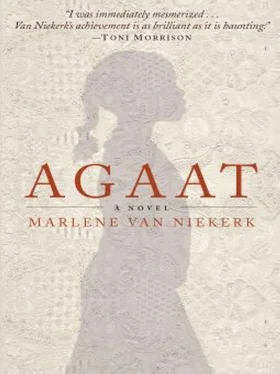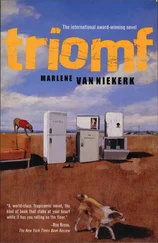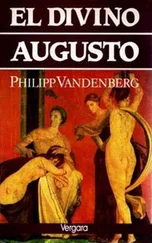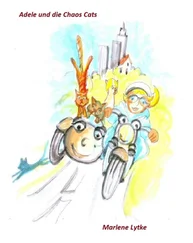Why would Agaat have come to read her daily ration at my bed’s foot today? Generally it is declaimed from the wheelchair, or from behind the walking frame. Not in the least a bedtime story. Rather to keep me awake. Now we have both slept. Now I have caught her out. In all the months that I’ve been lying here, this is the very first time.
Agaat’s glasses are perched at an angle on her nose. Her mouth is slightly open. Her lower lip gleams. Her breath comes thick from her throat. The sleep of a person who is tired unto death. The late afternoon sun slants a band of light through the curtains. There are shadows in the corners of the room. The coats and hats on the hatstand, the pictures and cloths against the wall, an agricultural show before the opening prayer.
I hear sparrows. It must be evening already. A busy time of day.
Milk. Cream. Eggs.
Irrigation, dogfood, chickenfeed.
The opening of the doors, the pushing up of the sashes to air the house in the cool of evening.
Supper.
But it’s a lapsed agenda.
Vaguely I can hear the clanking of cans, voices, a honking of geese coming to the dam, the door of the store being rolled open, the bakkie being pulled in.
Could I be dreaming it all? Is this thin distillation of yard noises the soundtrack of a dream? This golden radiance in the room, is it already the light of another order? My sleeping nurse, could her slumbering be a sign that I’m trapped with her in a bell-jar of oblivion?
The strips of sunlight shrink back from the walls, crawl down over the foot of the bed. They catch Agaat’s cap from the side, from behind and from the front. I can make out the embroidery distinctly. From the back it is darkly lit in silhouette, and from the front etched in relief. Negative and positive simultaneously.
The cap’s starched point casts a long rippling shadow on the pleats of the bedspread. Like a horn it looks. Or like the shadow of an old stringy snakeskin, semi-transparent in spots with the elongated shadow-patterns of the weft visible here and there.
White on white the cap is embroidered, in places studded with densely worked stitches. Only when the light falls on it as now, can you see the almost jewel-like contrivance. Now in this late-afternoon light it appears as if inscribed with a confusion of shadow-loops and lines.
Nobody, nobody except Jakkie when he was small, was allowed to look at it straight on. Over the years ever more forbidden, that zone above Agaat’s forehead. When she caught me out staring, she made me feel as if I were peeking through a transparent blouse.
But now she is asleep and I can stare to my heart’s content. The light plays over the riffles and stipples and eyelets and crenellations of the embroidery. The edges of the cap are bordered above and below with a satin fillet and finished with crocheted lacework. Are my eyes playing me tricks here? A design of musical notation I see, notes and keys and staves. As the light quickens and dims through the trellis on the stoep, through the panels of the glass door, through the gauze lining of the curtain, I can make out what is embroidered there. Am I seeing straight? A harp it seems to be, a syrinx, a tambourine, a trumpet, the neck of a lute. And hands I see, all the wrists bent, all fingers on strings and valves and stops.
Agaat stirs. She closes her mouth, she swallows. She feels my gaze. I must close my eyes before she wakes up. I can’t stand it any longer, the fencing with the eyes.
But I can’t stop looking. It’s like looking into clouds. Everything is possible. Wings it looks like, angels’ wings. They arch out gracefully from the backs of the musicians. But the trumpet-player has a pig’s snout. And the beak of the harpist is that of a bat. A wolf, grinning, beats the tambourine. A baboon with balloon-cheeks blows the syrinx, a rat with tiny teeth hangs drooling over the lute.
Agaat opens her eyes. Sleepily. She doesn’t know where she is. She blinks. Embarrassment steals over her face. The embarrassment is shed. Defensiveness takes its place. Confusion over her arm around my feet.
Never mind. You were tired. Good thing that you could rest. Never mind, it’s not serious. Calmly now. Give yourself time to wake up properly. There’s nothing to rush us.
But she’s angry. With herself. Angry that I saw her like that, angry that she’s late with everything. That evening arrived without her. She sits up straight, adjusts her glasses, adjusts her cap.
Don’t be angry. I saw nothing, I’ve also slept, I woke with you. We dreamt. All that I saw was a dream. See, I’m closing my eyes.
I can feel her distrust. Beneath the distrust, something else. Can it be true? I feel her withdraw. My feet miss the warmth. I hear the chair creak as she gets up. I open my eyes. She walks to the door. But she doesn’t open it, she just stands there. Her hands are at her sides, the little one and the big one. Her little shoulder sags. She turns round, I close my eyes. She comes back to the bed. I can hear her letting herself down on the chair. Her arms come around my feet, she presses them against her breast, tight, still tighter, she bends her neck, she presses her forehead against the arches of my feet, hard. The wolf and the rat and the pig, the syrinx and the tambourine, the whole merciless music she crumples up with one stroke against my ankles.

Was it the day after Jak’s breakdown that everything changed once more? Was it the morning after?
You didn’t want to remember all the things he’d said the night before. A pig with wings. Was he out of his mind? And the so-called fairytale that he contrived for himself out of it all? How could he distort your lives together like that?
In spite of the sleeping draught you couldn’t sleep. You were too scared to go and see whether Jak was back. At five o’clock you were up. Put on milk for coffee, went out into the backyard to throw away the shards of the earthenware jug that Jak had broken the night before. What goes up must come down, you said to yourself as you dumped the shards in the bin, your father’s words for the aftermath of family clashes.
The upper door of the outside room was open. You heard Agaat mumbling to herself over her ironing, the creaking of the ironing-board, smelt the steam and the starch, the thud-thud of the little iron with which she always ironed, a glimpse of the white apron in the dark little room. She was already dressed in her black dress and cap and shoes. Was ironing the apron, for the second time apparently, the seam, the bands, the pockets on the bib and the stomach.
She was frowning, shaking her head, as if trying to understand something, lost in a world of her own. You put your hands over your ears and fled back to the kitchen. You wanted to hear nothing more, could tolerate nothing more after the night before, suddenly fearful for all of you so constantly getting in each other’s way, trespassing on each other’s private space, beset by each other’s catastrophes. But there the milk was boiling over on the stove and you had to rescue it, clean the hob before it scalded. Then you heard the litany.
Help me with this and help me with that, and then a silence. And after a few thud-thuds of the iron on the board: She wanted him to be the master, she thought badly of herself, thought she was stupid, thought she was weak, she didn’t want to be her own master.
The irons were vigorously changed around on the hotplate.
But this is bad and that is wrong and gibe, gibe, gibe, constantly, whatever you do.
There was a hissing sound as Agaat sprinkled water on the ironing-cloth.
It was Jak’s emphatic strain of the night before.
God, must I listen to this for a second time, you thought, with the cloth drenched with burnt milk in your hands.
Читать дальше













